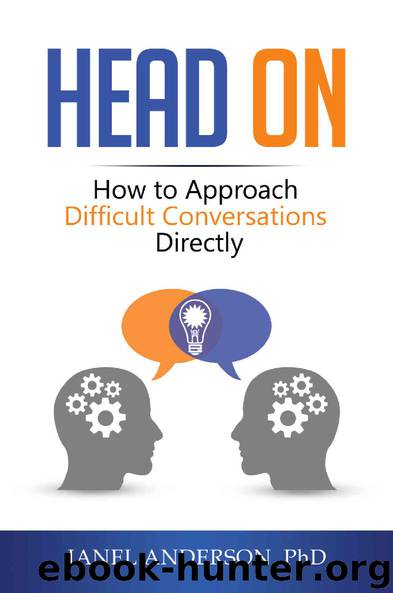Head On by Janel Anderson

Author:Janel Anderson [Anderson, Janel]
Language: eng
Format: epub
ISBN: 9780999580929
Publisher: Gale House
Published: 2018-10-21T22:00:00+00:00
Agreement is the conclusion you are striving for in a difficult conversation. If total agreement is not possible, you are at least striving for mutual understanding and a shared view of the situation. This chapter looks at how to generate agreement and how to handle situations where agreement feels out of reach, as it inevitably will in some situations.
TYPE 1 OR TYPE 2 AGREEMENT
When agreement can be reached in one conversation, it is what I call Type 1 agreement. Perhaps your employee has been late to work three times in the past two weeks but otherwise has been a dependable and punctual employee. The first time it happened, you didn’t mention it. After all, he’s been so dependable. Anyone can have a little mishap, right? The second time you thought seriously about bringing it up with your employee, but got distracted by a more important matter. Now it’s happened three times-within two weeks-and you’re not the kind of person who saves things up and lambasts employees in their annual performance review. So you bring it up. And it is very likely that you can resolve the matter in one conversation. Type 1 agreement.
Other times, it will take two or more conversations to reach agreement. I refer to these situations as Type 2 agreement. Perhaps this isn’t the first time you’ve raised the issue. Maybe it’s not even the second or the third. It’s the eleventh time you’ve discussed it … and the behavior hasn’t changed. Or maybe it is an issue that has persisted for a long time without anyone addressing it. Or perhaps trust has been broken (or was never established in the first place). Or in still other cases, you may not have respect for the other person. In any of these situations, it will take two or more conversations to ultimately reach agreement.
It is important to note that in a Type 2 situation, you want to start by addressing an appropriately sized portion of the situation (think small). Since it is going to take more than one conversation, there is no rush to solve it all at once. In parsing it out into multiple conversations, you create the opportunity to build trust over time, restore respect, and strengthen the relationship. Follow this four-step process in a Type 2 situation in order to provide structure and end with agreement, each step of the way.
Acknowledge the situation. In the case of Nancy from the previous chapter, the woman who is estranged from her sister: “We haven’t spoken in ten years.”
State your motivation to change the situation. “You’re my sister and you’re important to me.”
Share your commitment to your motivation. “I’d like to work on restoring our relationship, and I know it might not be easy.”
Ask for their commitment in return. “Are you in?” If she says yes, that’s a great place to end the first conversation. Make a commitment to talk again soon, for example, “I’ll see you at mom’s birthday dinner in a few weeks and we can spend a little time together then.
Download
This site does not store any files on its server. We only index and link to content provided by other sites. Please contact the content providers to delete copyright contents if any and email us, we'll remove relevant links or contents immediately.
How to Stop Worrying & Start Living by Dale Carnegie(1618)
You're Not Listening by Kate Murphy(1604)
How to Talk to Anyone by Leil Lowndes(1469)
Bound by You(1451)
The Essentials of Business Etiquette by Barbara Pachter(1384)
Limitless: Upgrade Your Brain, Learn Anything Faster, and Unlock Your Exceptional Life by Jim Kwik(1306)
The Art of Public Speaking by Dale Carnegie(1260)
The Victorian Internet by Tom Standage(1251)
The Attention Merchants by Tim Wu(1233)
Powerful Phrases for Dealing with Difficult People by Renèe Evenson(1117)
Sizing People Up by Robin Dreeke & Cameron Stauth(1075)
Design For How People Learn (Eva Spring's Library) by Julie Dirksen(999)
Art of Captivating Conversation by Patrick King(960)
True Story by Michael Finkel(952)
The Art of Community by Bacon Jono(945)
Becoming Facebook by Mike HOEFFLINGER(890)
Marissa Mayer and the Fight to Save Yahoo! by Carlson Nicholas(857)
The Presentation Secrets of Steve Jobs by Gallo Carmine(856)
The Art of Speeches and Presentations by Philip Collins(853)
